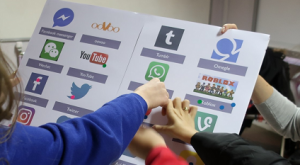New report on effects of social media on 8-to-12-year-olds shows the way children use social media and its effects on their wellbeing hits a ‘cliff edge’ when they start secondary school.
- ‘Life in Likes’ fills a gap in research showing how younger children use platforms which the social media companies say are not designed for them.
- While 8-10s use social media in a playful, creative way – often to play games – this changes significantly as children’s social circles expand in Year 7.
- The report shows many Year 7 children are finding social media hard to manage and becoming over-dependent on ‘likes’ and ‘comments’ for social validation. They also adapt their offline behaviour to fit an online image.
- Children become increasingly anxious about their online image and ‘keeping up appearances’ as they get older. This can be made worse when they start to follow celebrities and others outside close family and friends and this group grows significantly upon starting secondary school. Their use of platforms like Instagram and Snapchat can also undermine children’s view of themselves by making them feel inferior to the people they follow.
- Children feel social pressure to be constantly connected at the expense of other activities – especially in secondary school where the whole class often have their own phone and are on social media.
- Children worry about ‘sharenting’ – parents posting pictures of them on social media without their permission; they feel that parents will not listen if they ask for them to take photos down.
- Children’s Commissioner, Anne Longfield is calling on schools and parents to prepare children for this change towards the end of primary school. She also calls for compulsory digital literacy and online resilience lessons for Year 6 and 7s, so that they learn about the emotional side of social media and not just messages about safety.
Anne Longfield, the Children’s Commissioner for England, is today launching a new report, ‘Life in Likes’, on the impact of social media on the lives of children before they become teenagers. Whilst most social media sites have an official age limit of 13 years, some research has suggested ¾ of 10-to-12 year olds have a social media account. Today’s report reveals many children are approaching a ‘cliff edge’ as they transition from primary to secondary school, with social media becoming much more important in their lives but causing them greater anxiety. The study suggests some children are becoming almost addicted to ‘likes’ as a form of social validation that makes them happy and that many are increasingly anxious about their online image and ‘keeping up appearances’.
Harry, 11, Year 6: “When you get 50 likes it makes you feel good cos you know people think you look good in that photo.
Aaron, 11, Year 7: “If I got 150 likes, I’d be like that’s pretty cool, it means they like you.”
‘Life in Likes’ is based on a series of focus groups with 8 to 12 year olds, and reveals two sides to social media: one side which helps younger children to discover new things about the world around them, which boosts their moods and allows them to be creative, but another side among those approaching their teens which makes them worry about things they are not able to control. The ‘cliff edge’ often appears as children move into secondary school, with their use of social media changing from becoming about games and creativity to more about social interactions and image.
The study shows how social media is important for maintaining relationships, but this gets harder for children to manage at secondary school. Children are constantly contactable and connected, and being ‘offline’ or uncontactable is considered socially damaging. Some children talked about feeling social pressure as a result: people could fall out if their friends felt they weren’t responsive enough online, even to relatively superficial interactions, for example not responding quickly enough to ‘Snapstreak’ messages, so that the ‘streak’ between two friends was lost. By secondary school, where children felt the whole class was on social media, this pressure becomes impossible to ignore.
Merran, 12, Year 7: “I send Bridie lots of messages saying ‘respond’ until she does [reply to a Snapstreak].”
Billy 9, Year 5: “When you get a buzz, and then you go to get it but you don’t. And then you get another buzz and another buzz, and another buzz. And then you’ve just got to go get it, and then you just go off course with your homework.”
Many children are also conscious of keeping up appearances on social media, particularly when they start secondary school. Many talk about wanting to look like the people they see online, worrying about whether people would like their posts, and thinking about how to present their offline life so it looked good on social media. Many children in Year 6 and 7 were regularly using Instagram and Snapchat, where they could follow adult celebrities, meaning their world is blurred with celebrities’, who lead very different lives to them. As these social media platforms are very image heavy, it was easy for children to compare themselves to the people they were following on social media. Some of the older children described feeling inferior to those on social media, showing that they were often making comparisons with people who they perceived to be better off than them in various ways.
Aimee, 11, Year 7: “You might compare yourself cos you’re not very pretty compared to them.”
Annie, 11, Year 7: “I just edit my photos to make sure I look nice.”
Harry, 11, Year 6: “If you don’t have designer and expensive things people will make fun of you.”
Bridie, 11, Year 7: “I saw a pretty girl and everything she has I want, my aim is to be like her. I want her stuff, her white house and her MAC makeup. Seeing her makes me feel cosy.”
It is also clear that many children are uncomfortable about their parents posting pictures and videos of them on social media. This feeling came partly from feeling embarrassed by the way they looked, but also from the feeling that they had no control once something was posted – many mentioned that they didn’t feel their parents would take something down if they asked.
Hassan, 8, Year 4: “My mum takes pictures of me on Snapchat, to send on Whatsapp … I don’t like it when your friends and family take a picture of you when you don’t want them to.”
The report does suggest that parents and schools are successfully teaching children about online safety from predators and strangers. Yet, it also suggests children are less aware of how to protect themselves from other online situations that could affect their mood and emotions. Staying safe online was a priority for many of the younger children and most children have strict rules about what they can and cannot share online, but there is less awareness about the emotional effects of social media. Many children seemed to lack techniques in how to deal with the impact of upsetting comments online.
Anne Longfield, the Children’s Commissioner for England, launching today’s report, said:
“While social media clearly provides some great benefits to children, it is also exposing them to significant risks emotionally, particularly as they approach Year 7. I am worried that many children are starting secondary school ill-equipped to cope with the sudden demands of social media as their world expands. It is also clear that social media companies are still not doing enough to stop under-13s using their platforms in the first place.
“I want to see children living healthy digital lives. That means parents engaging more with what their children are doing online. Just because a child has learnt the safety messages at primary school does not mean they are prepared for all the challenges that social media will present. It means a bigger role for schools in making sure children are prepared for the emotional demands of social media. And it means social media companies need to take more responsibility.
“Failing to do so risks leaving a generation of children growing up chasing ‘likes’ to make them feel happy, worried about their appearance and image as a result of the unrealistic lifestyles they follow on platforms like Instagram and Snapchat, and increasingly anxious about switching off due to the constant demands of social media.”






